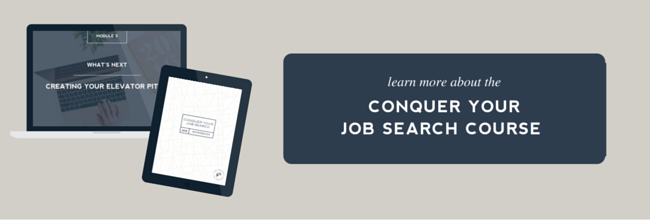I’m so excited to write this post in conjunction with the launch of my first ever online course. It’s been in the works for months and in the back of my mind for years – I’m pumped launch day is here!
The course, as well as this post, both focus on a topic I’m really passionate about.
Working smarter and not harder when it comes to the job search.
Let’s face it — no one loves job searching and no one wants to spend multiple hours each day trying to solve this problem.
Unless you’re that one person out there, that means you’re going to have to get smarter and more strategic about the way you job search. Let’s talk about how to make that happen.
Only apply for roles you actually care about
I find that people start to get a bit desperate while job searching and start applying to anything and everything they can find online, even if they’re not excited about it. They figure that the more applications they get in there, the faster the process will move.
Applying to jobs randomly is a complete waste of time. You’re going to waste time on a crappy application, potentially waste more time interviewing if the company calls, and ultimately all of this time is spent for an offer you’re not going to be excited about and may not even take.
My advice: I would much rather see my clients submit a few high-quality jobs each week that they really care about and put actual time and effort into the application process.
Your time is valuable. Spend it on the roles you’d actually want to follow through with in the end. Otherwise, what’s the point?
Leverage time-saving tools
We’re lucky because right now there are a bunch of really helpful tools that enable us to automate many aspects of job searching.
For example, by setting job alerts on Indeed or LinkedIn, you can have the jobs you want come directly to your inbox each day, vs. spending tons of time on job boards.
With the LinkedIn jobs app, you can often use the “easy apply” feature and avoid spending an hour filling out details that are already on your resume in a rusty online system. Also, you get to skip writing a cover letter!
This is just the tip of the iceberg and more and more companies (like my friends at UpScored) are working on tools to make this process easier for job seekers.
My advice: Tap into these tools, automate what you can, and use your time for things that are really going to make a big impact.
Once you apply, don’t just sit back and wait
Now if I’m telling you to spend your time submitting a few high-quality applications each week, we’re going to have to make sure they count.
A resume sitting in a black hole doesn’t do you any good. If you’ve found a job you really care about, don’t let it go.
My advice: Be proactive and respectfully relentless, and find a way to get in touch with an actual human from the company. Even if you send a cold email, that is way better than doing nothing.
We’re talking about working smarter and that means making the most of every single application you submit.
When you land an interview, give yourself every possible advantage to ace it
When it comes to the interview part of the job search process, it can be really long and dragged out or a one-and-done situation. Raise your hand if you prefer the latter!
A lot of people walk into interviews thinking that the interviewer is working against them and planning to ask questions to trick them. While it’s true that they’re going to be thorough, most interviewers actually walk into a job interview hoping you’re going to be the one for the job.
Think about it – this person has already looked at your resume, picked it out from hundreds of others, and already thought to themselves, “this could be the person for the job.” It’s your job to prove them right.
My advice: Walk into every interview you have like it’s going to be the last one you need to go on. Be confident that you have what it takes.
Additionally, a large percentage of questions can be anticipated and prepared for like a test. This is not to say you should be scripted or disingenuous but you should always know:
- Your professional story, how the dots connect, and why those dots have led you to the exact interview you’re going on
- About the job – inside and out. You should also know why you’d be the best person to do that job and how your past experiences and skills will enable you to be great at it
- Why you are interested in working on this job at the specific company you’re interviewing with. This entails a good amount of research. Don’t just give the most obvious reason. Give depth.
The Conquer Your Job Search course covers all of these topics in a ton more depth through step by step video modules with corresponding exercises and 20+ templates and scripts you can use throughout your search.
Its goal is truly to make you a more efficient job seeker, so you can land a job you love and get back to doing what you do best.






